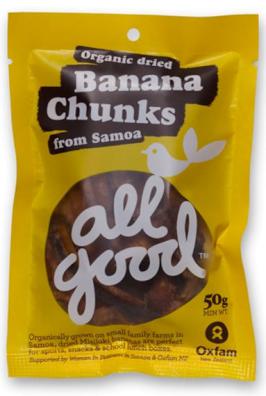Balancing Samoa’s trade deficit – one banana at a time
Balancing Samoa’s trade deficit
–
one banana at a time.
All Good Bananas
New Zealand’s trading relationship with Samoa is long established but embarrassingly one-sided.
Back in the 1950’s, bananas accounted for a fifth of the money Samoan villages earned from export, and 62.5% of Western Samoa’s exports to New Zealand*. This however, changed dramatically. With increased demand and more accessible shipping, NZ importers started looking further afield to cheaper producers in South America and the Philippines.
*Source: ‘The Banana Industry in Western Samoa’, R. Gerard Ward, University of Auckland
New Zealand meanwhile, continues to grow its exports to Samoa, while Samoa’s trade into New Zealand is diminishing. In 2010, (NZ)$127.5 million worth of exports were shipped to Samoa (an increase of 31% on 2008 figures), compared to NZ$3million shipped back in return to New Zealand from Samoa (a decline of 55% on 2008 figures). The trade imbalance is staggering – in 2010 New Zealand exported 40 times more to Samoa than Samoa was able to export to New Zealand.

This week the banana boat started shipping bananas to New Zealand again and, in a small way, this imbalance is being redressed. New Zealand’s only locally owned banana company All Good Organics have re- introduced New Zealander’s to ethically sourced organic dried bananas from Samoa.
Says Chris Morrison, Co-Founder of All Good Organics, “Establishing sustainable trade with our Pacific neighbours was something we’ve been working on since the outset of All Good. New Zealand previously sourced all of its bananas from the Pacific and we were keen to re-introduce this important trade route. Samoa gets trade with New Zealand, and we get delicious dried bananas. It’s a win-win for everyone”.
To bring the dried bananas to New Zealand, All Good Organics started working with Oxfam and Samoa’s Women in Business Development Incorporated; a not-for-profit organisation working with over 250 small-scale farmers growing organically certified Misiluki bananas in Apia. Partnering closely with Oxfam and WIBDI, All Good have been able to provide these Samoan farmers with a market for a product that currently has almost no economic value locally.
As well as being good for the growers, and in turn Samoa, there are plenty of documented health benefits for eating All Good’s organic dried banana chunks too.
Unlike banana chips, which are commonly deep fried, All Good’s banana chunks are naturally dried. Made from the Misiluki, a sweeter tasting banana than the more commonly available Cavendish variety, the bananas are first peeled, then sliced and dried ripe.

Dried bananas are a good source of carbohydrates, low in fats and have no cholesterol. Being low in sodium and high in potassium, they can help to maintain blood pressure and reduce the risk of hypertension, heart diseases and atherosclerosis. They are also a great source of magnesium (which helps to relieve fatigue, relax the muscles, nerves & blood vessels), copper (which can help to reduce the risk of inflammatory diseases like rheumatoid arthritis) and manganese (which aids in the production of energy) as well as containing Vitamin C, Vitamin B6 and B-group vitamins.
All in all making All Good’s organic dried banana chunks good for the growers’ futures, as well as a tasty healthy sweet treat for you too.
**End** For more information: http://allgoodbananas.co.nz/


 Hugh Grant: Lessons From Australia - How Digital Tools Could Support NZ Nurses In Palliative Care
Hugh Grant: Lessons From Australia - How Digital Tools Could Support NZ Nurses In Palliative Care Canterbury Museum: Dinosaur Dolphins Survived In New Zealand Long After Extinction Elsewhere
Canterbury Museum: Dinosaur Dolphins Survived In New Zealand Long After Extinction Elsewhere Retail NZ: Retailers Still Under Pressure At End Of 2024
Retail NZ: Retailers Still Under Pressure At End Of 2024  University of Canterbury: Research Sheds Light On Fire Risk For Canterbury
University of Canterbury: Research Sheds Light On Fire Risk For Canterbury GE Free NZ: Potential $20 Billion Loss In Export Demand Threatens Rural Communities
GE Free NZ: Potential $20 Billion Loss In Export Demand Threatens Rural Communities Science Media Centre: Carbon-storing Construction Materials – Expert Reaction
Science Media Centre: Carbon-storing Construction Materials – Expert Reaction



